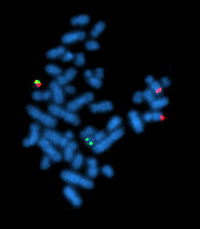
Photo from wikipedia
Constitutive activation of tyrosine kinase Bcr-Abl is the leading cause of the development and progression of chronic myeloid leukemia (CML). Currently, the application of tyrosine kinase inhibitors (TKIs) targeting the… Click to show full abstract
Constitutive activation of tyrosine kinase Bcr-Abl is the leading cause of the development and progression of chronic myeloid leukemia (CML). Currently, the application of tyrosine kinase inhibitors (TKIs) targeting the Bcr-Abl is the primary therapy for CML patients. However, acquired resistance to TKIs that develops overtime in the long-term administration renders TKIs ineffective to patients with advanced CML. Therefore, increasing studies focus on the amplified expression or activation of Bcr-Abl which is proposed to contribute to the advanced phase. Here, we show that S-phase kinase-associated protein 2 (SKP2) acts as a co-regulator of Bcr-Abl by mediating its K63-linked ubiquitination and activation. Further investigations show that USP10 as a novel deubiquitinase of SKP2 amplifies the activation of Bcr-Abl via mediating deubiquitination and stabilization of SKP2 in CML cells. Moreover, inhibition of USP10 significantly suppresses the proliferation of both imatinib-sensitive and imatinib-resistant CML cells, which likely depends on SKP2 status. This findings are confirmed in primary CML cells because these cells are over-expressed with USP10 and SKP2 and are sensitive to a USP10 inhibitor. Taken together, the present study not only provides a novel insight into the amplified activation of Bcr-Abl in CML, but also demonstrates that targeting the USP10/SKP2/Bcr-Abl axis is a potential strategy to overcome imatinib resistance in CML patients.
Journal Title: Cell Discovery
Year Published: 2019
Link to full text (if available)
Share on Social Media: Sign Up to like & get
recommendations!